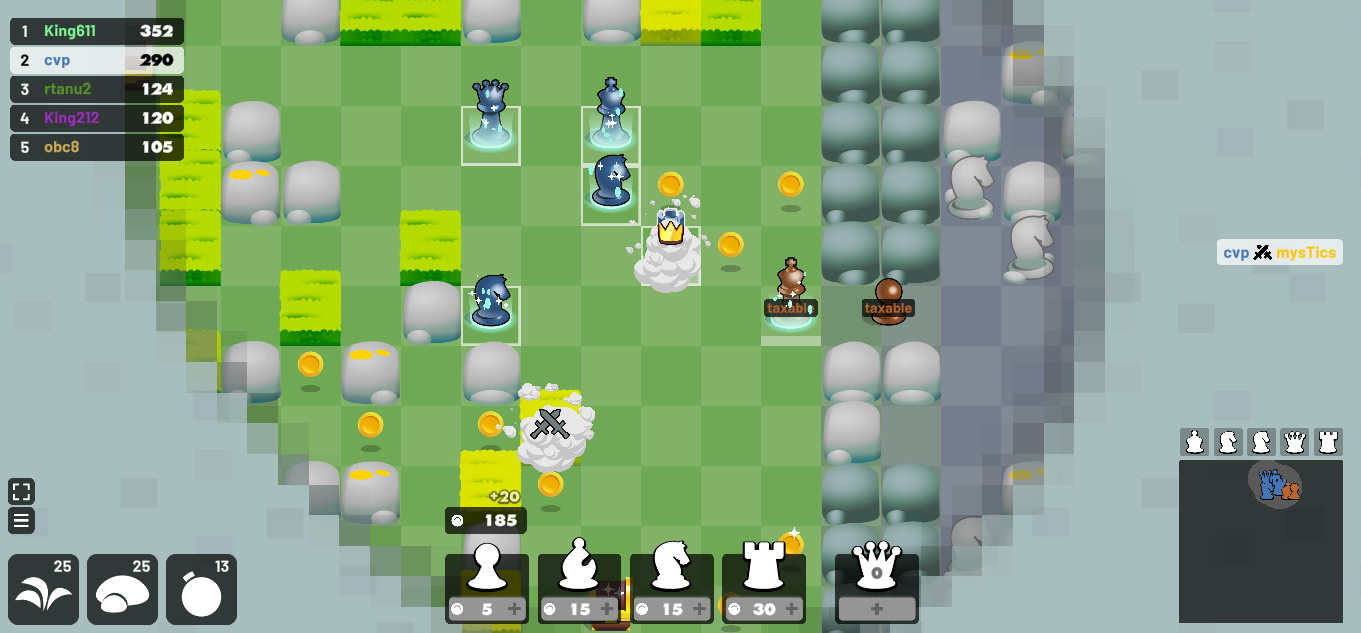External Link: ChessArena.io
ChessArena is an "io style" game: realtime, multiplayer, and online. It is (at time of writing) in a beta release; the description here may be somewhat out of date.
As a realtime chess variant, it is similar to Kung Fu Chess: pieces slide at a fixed velocity through their moves, and have a cooldown before they can be moved again. Here, pieces can have moves queued during their cooldown, and will make that move immediately after their cooldown is complete.
The board is square-celled and quite large, and supports many players at once. Players have limited range of vision around each of their pieces, and pieces have limited movement range. Coins and treasure chests spawn on empty squares, and rocks and bushes can be placed by players. Coins can be spent on pieces and form the basis of the points system; treasure chests contain bombs, rocks, or bushes; rocks block movement by pieces; bushes hide pieces within them from view of opponents; and bombs explode after a few seconds, destroying any pieces or terrain within the 3x3 region surrounding themselves.
Each player enters the game (asynchronously) with a lone king, and can control up to four other pieces at any given time. Pawns, knights, bishops, and rooks can be purchased, while queens must be won through quests or obtained from special tiles; these new pieces are dropped on any empty cell adjacent to any of the players' pieces. Capturing or destroying an opponent's king removes that player and all their pieces from the board.
Pieces gain experience from collecting coins or capturing opponents' pieces. With enough experience, pieces "level up" and obtain improved capabilities: increased area of vision, reduced cooldown time, faster movement, and (except the knight) increased movement range. (Piece level is visually recognizable by sprites.)
Pawns require a bit more explanation. They move without capturing orthogonally (any direction), one two or three spaces depending on experience level. They capture one square diagonally at any level. Pawns move into bushes as though they were empty, possibly capturing on orthogonal moves; and a pawn cannot capture diagonally into a bush, even if the player knows there is a piece there. (These do not hold during the quest that permits bush vision: then bushes essentially do not exist.) A pawn that starts to capture but finds its target square empty will land there anyway, and a pawn that starts a non-capturing move but finds pieces in its way will capture it; this is most common when such a move is queued for the pawn during its cooldown.

Strategy
This can never be exhaustive, but a few notes on strategy.
Large-scale strategies
- Using bushes to hide—only leaving when threatened, to ambush a player, to collect items, or to complete quests—is a fairly safe if uninsteresting strategy.
- When pieces move inside bushes they will remain hidden throughout the move if and only if the move happens entirely within the bushes; i.e. diagonal movements require both orthogonally adjacent squares to be bushes to remain hidden, and knight moves require all six squares to be bushes. Creating spaces for you to move unnoticed inside bushes can be powerful, but also risks enemies penetrating your space and roaming unnoticed.
- Building rock walls to limit unwanted traffic, or to route pieces into a desired location, can be useful. You may leave corridors open to the pieces you intend to use, while limiting movement of other types. (E.g. lines of rocks that can only be jumped over by knights, rocking many dark-colored squares and recruiting only light-square bishops, ...)
- Hiding a king while having a separate attack force roam the map can be safer (and faster) than moving the entire troop, but certain quests (zombies, falling rocks) make this dangerous.
Tactics
- Bait. Leave a piece in range of an opponent piece. When the opponent tries to capture, move the bait piece out of the way. A second piece can be positioned to recapture (or, if the bait piece is sufficiently higher level than the opponent, it can sometimes move back in time to recapture).
- Screen. Opponents will sometimes not notice/realize that screens can be removed and the discovered attack executed immediately.
- Edge bombs. When a piece is against a board edge (or rock wall edge), placing a bomb orthogonally adjacent to that piece away from the wall covers all that piece's escape squares in the blast radius, and it is very unlikely that they can move two squares before the explosion.
External Link: https://beta.chessarena.io/
 This 'user submitted' page is a collaboration between the posting user and the Chess Variant Pages. Registered contributors to the Chess Variant Pages have the ability to post their own works, subject to review and editing by the Chess Variant Pages Editorial Staff.
This 'user submitted' page is a collaboration between the posting user and the Chess Variant Pages. Registered contributors to the Chess Variant Pages have the ability to post their own works, subject to review and editing by the Chess Variant Pages Editorial Staff.
Author: Ben M Reiniger. Inventor: ChessArena.
Last revised by Ben Reiniger.
Web page created: 2021-06-19. Web page last updated: 2021-09-30
